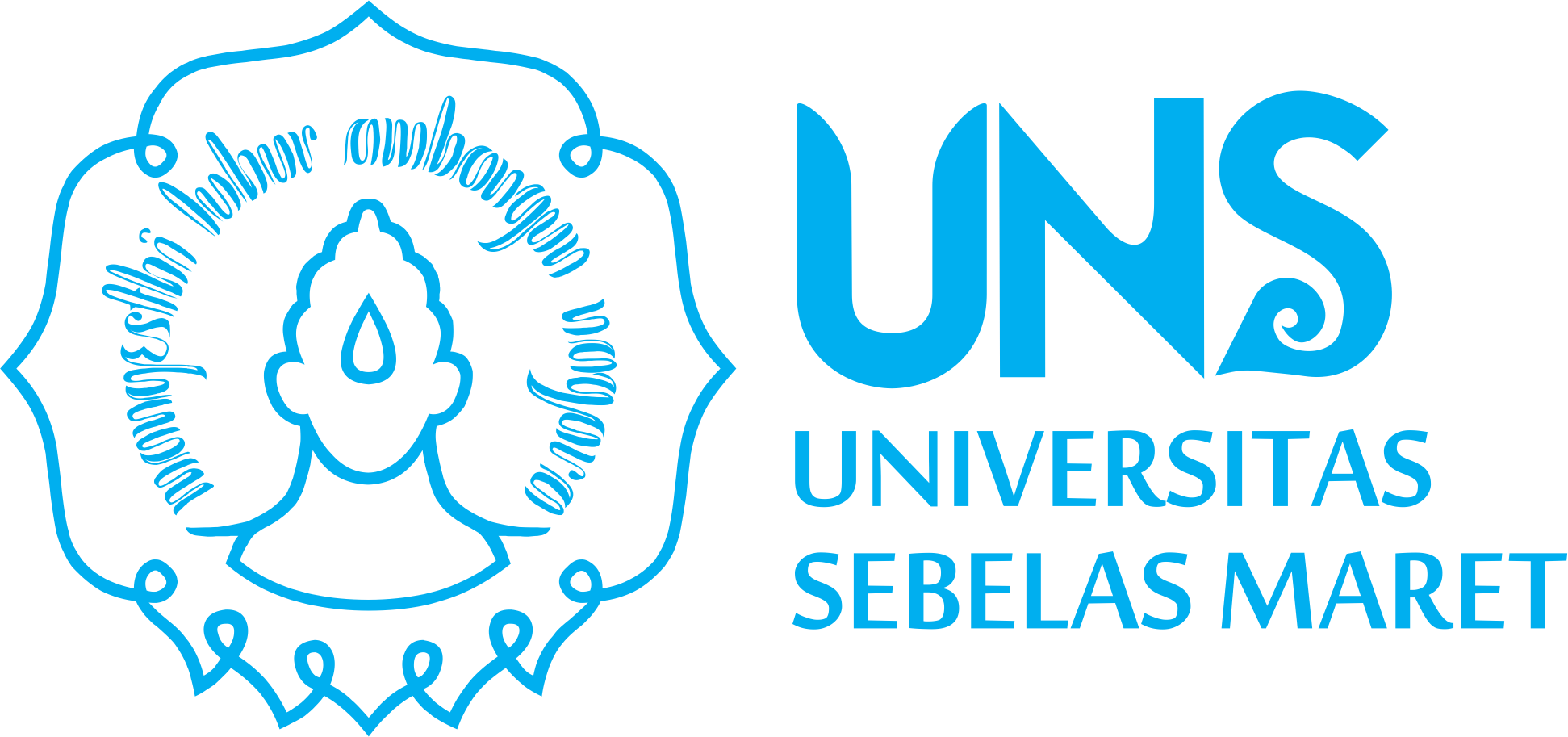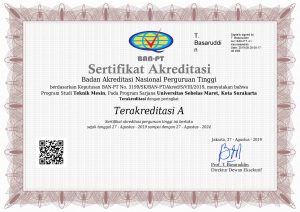Surakarta, June 26, 2020 Study Program S1 – Mechanical Engineering, Sebelas Maret University (UNS) held a guest lecture which was conducted online via Via Zoom. This guest lecture was attended by students, lecturers, and also UNS Mechanical Engineering alumni. This guest lecture was titled “OIL AND GAS INDUSTRY”. The speaker at the guest lecture was Sekar Wuri Dewayani, who was an alumni from the University of Mechanical Engineering in March 2008. He was usually called Mbak Sekar or Mbak Dea. Mbak Dea now works as a Well Planner at one of the oil and gas companies in Indonesia, namely PT. Weatherdord Indonesia. Ms. Sekar began her career in October 2008 as an Oil Spill Responder at Slickbar Indonesia, Jakarta, Indonesia. In addition, he also worked in manufacturing.
In a guest lecture it’s different from the norm. This is caused because it is still in the Covid Pandemic 19 situation, so this guest lecture was held online using via Zoom. Participants in this guest lecture were quite a lot, around 132 participants. In this guest lecture, he gave us material on the basics learned in the oil and gas industry in Indonesia, such as: Overview of Drilling Operations, Rig Components, Drilling Services, and also Drilling Plans. In this guest lecture he also shared how he experienced the experience when working in the oil and gas industry in Indonesia.
His motivation from the beginning has been struggling in the field of oil and gas in Indonesia is “NEKAD”. This means that he does not have any provisions relating to the oil and gas industry in Indonesia, bearing in mind that he graduated from Mechanical Engineering, not Petroleum Engineering, but he likes things that exceed his comfort zone, meaning he likes new things which he does not know and master. But there are still Mechanical Engineering lessons related to the world of oil and gas such as: Basic Physics, Energy Conservation, etc. And his superiority compared to other graduates is that he is proficient in designing images using Autocad, which he has long studied in Mechanical Engineering.
The tricks and ways that he can understand the world of oil and gas is that when we are received, we will receive training from the company, and there will also be a Competency Test, so we will continue to be motivated to continue learning, and fortunately we learn about things new one but we remain on salary. In addition, he also said not to be afraid to try new things because there will always be people who will help us when we experience difficulties.
Many people doubt that the oil and gas world in Indonesia is indeed a promising start, but in the long run the price of oil and gas in the world is falling, and also its supply is getting less and less. He responded with “That in the world of work no one can guarantee how the future of the work. Every job has its own risks and dependencies. We as humans can only be sure of the decisions we make, and we must be sure that the work we take going forward is a plan from God that is good for us. He also advised women who are interested in the world of oil and gas so they are not inferior and don’t be afraid to try new things using Planning Career. “Said Ms. Dea (Surakarta, June 26, 2020)





Allennit
21 Aug 2024Your comment is awaiting moderation.
Philosophy is the discipline that studies major and universal questions, including existence, knowledge, values, reason, and language. It encompasses a vast number of subjects and problems, from ethics and political figures to metaphysics and logic. Here are principal nuances of philosophy:
1. Definition of Philosophy
Philosophy comes from the Greek words “philos” (love) and “sophia” (wisdom). It is the desire to understand and make sense of the world around us and our place in it.
2. The Main branches of philosophy
– Ontology the study of the essence of being and existence.
– Epistemology the study of the nature and limits of knowledge.
– Ethics the analysis of moral principles and concepts of good and evil.
– Logic the study of the forms and principles of correct thinking.
– Socio-political philosophy the study of questions of power, justice and the state.
3. Famous Philosophers
During the history of philosophy, many thinkers have made significant contributions to this science. Some of the most famous include:
– Socrates, considered the founder of Western philosophy.
– Plato, a pupil of Socrates, developed the doctrine of forms.
– Aristotle, the creator of logic and a large number of scientific fields.
– Immanuel Kant, known for his own [url=https://thephilosopher.net/miller/]Henry Miller[/url] critical philosophy and work on moral issues.
4. The Relevance of Philosophy in the Modern World
Philosophy remains urgent in the modern world as enables people to understand complex social and moral issues, but also develops critical thinking. It influences the legal system, politicians, and various fields of science.
5. Practical Applications of Philosophy
Philosophical ideas penetrate everyday life. Ethical reflection helps people do the correct thing in complex situations, and philosophical analysis contributes to most excellent understanding of issues related to technology, art, and social justice.
Philosophy is not only an academic discipline, as well as a way of thinking that helps us to understand life’s complexities and make informed choices.
Allennit
21 Aug 2024Your comment is awaiting moderation.
Philosophy is the discipline that studies major and universal questions, including existence, cognition, values, reason, and language. It encompasses a vast number of subjects and problems, from ethics and political figures to metaphysics and logic. Here are the main nuances of philosophy:
1. Definition of Philosophy
Philosophy comes from the Greek words “philos” (love) and “sophia” (wisdom). It is the desire to understand and make sense of the world around us and our place in it.
2. The Main branches of philosophy
– Ontology the study of the essence of being and existence.
– Epistemology the study of the nature and limits of knowledge.
– Ethics the analysis of ethical principles and concepts of good and evil.
– Logic research of the forms and principles of correct thinking.
– Political philosophy the study of questions of power, justice and the state.
3. Famous Philosophers
Throughout the history of philosophy, many thinkers have made meaningful contributions to this science. Some of the most famous include:
– Socrates, considered the founder of Western philosophy.
– Plato, a student of Socrates, developed the doctrine of forms.
– Aristotle, the creator of logic and many of scientific fields.
– Immanuel Kant, known for his [url=https://thephilosopher.net/joyce/]James Joyce[/url] critical philosophy and work on moral issues.
4. The Relevance of Philosophy in the Modern World
Philosophy remains relevant in the modern world as enables people to understand complex social and ethical issues, also develops critical thinking. It affects the legal system, politicians, and various fields of science.
5. Practical Applications of Philosophy
Philosophical ideas penetrate everyday life. Ethical reflection helps people do the correct thing in complex situations, and philosophical analysis contributes to greatest understanding of problems related to technology, art, and social justice.
Philosophy is not only an academic discipline, but also method of thinking assists us to understand life’s complexities and make informed choices.
Allennit
21 Aug 2024Your comment is awaiting moderation.
Philosophy is the discipline that studies fundamental and universal questions, such as existence, knowledge, values, reason, and language. It covers a vast number of topics and issues, ranging from ethics and politicians to metaphysics and logic. Here are the main nuances of philosophy:
1. Definition of Philosophy
Philosophy comes from the Greek words “philos” (love) and “sophia” (wisdom). It is zeal to understand and make sense of the world around us and our place in it.
2. The Main branches of philosophy
– Ontology research of the essence of being and existence.
– Epistemology the study of the nature and limits of knowledge.
– Ethics the analysis of ethical principles and concepts of good and evil.
– Logic the study of the forms and principles of correct thinking.
– Socio-political philosophy the study of questions of power, justice and the state.
3. Eminent Philosophers
Throughout the history of philosophy, many thinkers have made meaningful contributions to this science. Some of the most famous include:
– Socrates, considered the progenitor of Western philosophy.
– Plato, a pupil of Socrates, developed the doctrine of forms.
– Aristotle, the creator of logic and many of scientific fields.
– Immanuel Kant, known for his [url=https://thephilosopher.net/joyce/]James Joyce[/url] critical philosophy and work on moral issues.
4. The Relevance of Philosophy in the Modern World
Philosophy remains urgent in the modern world as enables people to understand difficult social and ethical issues, but also develops critical thinking. It affects the legal system, politicians, and different fields of science.
5. Practical Applications of Philosophy
Philosophical ideas enter daily life. Ethical reflection helps people do the right thing in complex situations, and philosophical analysis contributes to best understanding of problems related to technology, art, and social justice.
Philosophy is not only an academic discipline, but also a way of thinking assists us to understand life’s complexities and make informed choices.